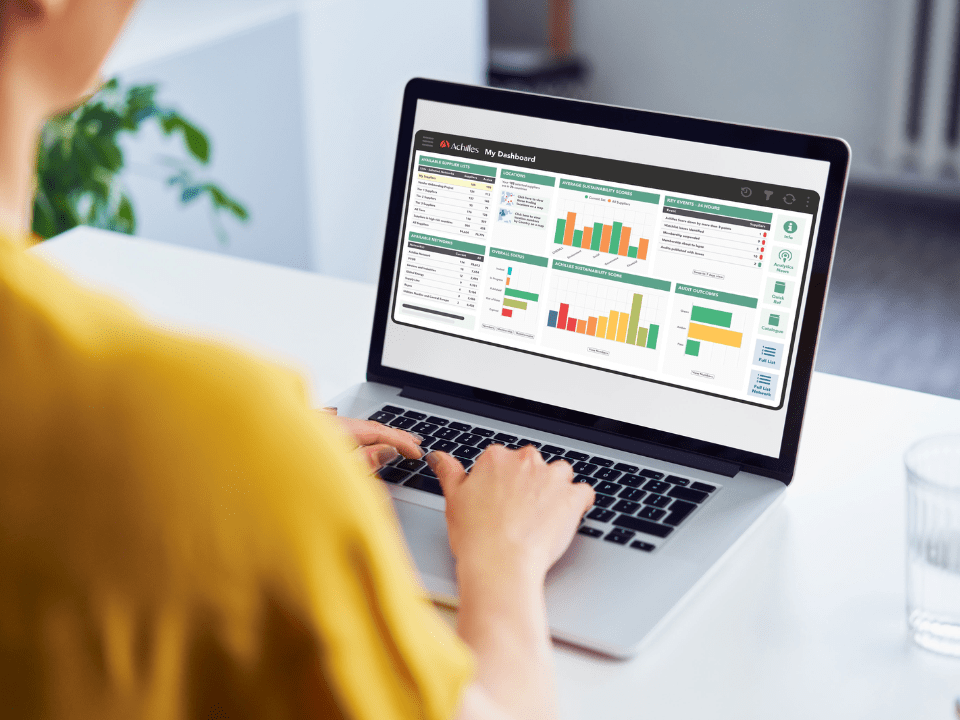Date: 12 May 2020 | Time to read: 5 mins
“We are facing a global crisis that is leading to a delayed isolation of different regions around the world. This is causing disruptions at a global scale, and represents a major challenge when it comes to managing international supply chains and ensuring security. This is particularly prevalent with managing continuity of supply in regions and sectors that are not moving at the same time and with the same restrictions in place“, says Javier Caravantes.
Javier, a Chief Procurement Officer and an Achilles Ambassador with more than 12 years’ international experience, recently collaborated with Achilles in an online webinar. He presented a current and future vision of how COVID -19 is affecting global supply chains and what measures must be taken in the medium and long term to mitigate this impact.
“The initial impact in China, a current source of global supply in a multitude of sectors, has affected many production environments,” observed Javier. “It has severely impacted the automotive and electronic industries and we are also seeing challenges in the transport sector (noting there are worrying bottlenecks in air transport). The movement of goods through customs and clearance has been challenging with the constantly changing legislation. This initial impact has been so severe that supply chains are not expected to normalise until late 2020 or early 2021. ”
This is borne out in the results of a customer survey undertaken by Achilles in Spring 2020, during the initial impact of the pandemic. With a global reach, and customers across different sectors, the insights provided by Achilles customers shine a light on issues across the supply chain network and support Javier’s view of the impact of COVID-19 on global supply chains.
“More than 10% of respondents had taken no action whatsoever in regards to engaging their supply chains in response to the COVID-19 crisis.” Achilles COVID-19 survey.
Immediate challenges for purchasing teams
These immediate challenges are marked by action and the internal response of companies in managing supply. It is directly linked to their operational abilities but is increasingly reliant on their strategic management. In addition, the lack of visibility and transparency in the whole supply chain coupled with a lack of robust contingency plans meaning companies are facing challenges never seen before at this scale.
Javier outlines a series of measures that every procurement team should consider in order to mitigate against supply chain failure:
- Focus on planning. Unprecedented situations require unprecedented purchasing practices. The focus should be on forging close links between the buyer and suppliers so there is a real-time visibility of stocks, availability of labour, and shared common practices.
- Visibility beyond Tier 1 . Having an extended supply network means that in times of a crisis there is real need to see beyond the tier 1 suppliers to be able to get a broader view and plan more accurately and effectively.
- Alternative supply sources expand activity into other markets, for instance, India is activating export promotion channels from its manufacturing activities.
- Work with alternative logistics routes. While alternative supply sources are being developed, the solution to a bottleneck involves supplying through logistics corridors that have been created in cooperation between governments and large companies. As is the case of the new air corridor between China and Spain with a stopover in Russia.
- Update inventory policy and planning parameters. In an environment where replenishment rates are inconsistent, delivery days immediately change, and stocks, even reserved, are not secured, it is necessary to anticipate and develop a plan to handle this rapidly changing scenario.
“Respondents rated their confidence in their own visibility of risks, the resiliency of their supply chains, and their own plans to manage the crisis between 3.5 and 4.1 out of 5. This translates to an average rating of “Very Confident” overall.” Achilles COVID-19 survey.
Supply chain management in the medium / long term
COVID-19 will mark a ’before’ and ‘after’ when it comes to risk management in supply chains worldwide. Companies will be forced to adapt to new digital supply chain models, supported by secure information exchange technologies, such as blockchain. For instance, two years ago Maersk and IBM launched ‘TradeLens’ to capture and manage transport events in a decentralized manner.
Now more than ever, it is essential to manage the risk associated with individual suppliers. Relying on solutions that provide a complete view of your supplier base, coupled with the ability to access a whole range of alternative and qualified suppliers in real time is essential to maintaining a healthy supply chain.
The new normal for buyers
According to Javier, the new normal can be summed up in two words, planning and collaboration.
“These two concepts are key when it comes to diversifying suppliers and being prepared for immediate changes in supply chain trends. These should be also taken into account when assessing the medium and long-term risk of suppliers and the ability to foresee disruptions as well as being better prepared for a crisis.” Javier concludes.
In collaboration with Rosslyn Data Technologies, we have produced a data analysis report of risks in the supply chain in relation to COVID-19. Our aim is to increase supply chain visibility for buying organisations allowing for a deeper understanding of where the potential risks lie within a supplier network and therefore help develop a comprehensive contingency plan through alternative supply routes.
Did you miss the webinar? You can watch it on demand by completing the form below:



